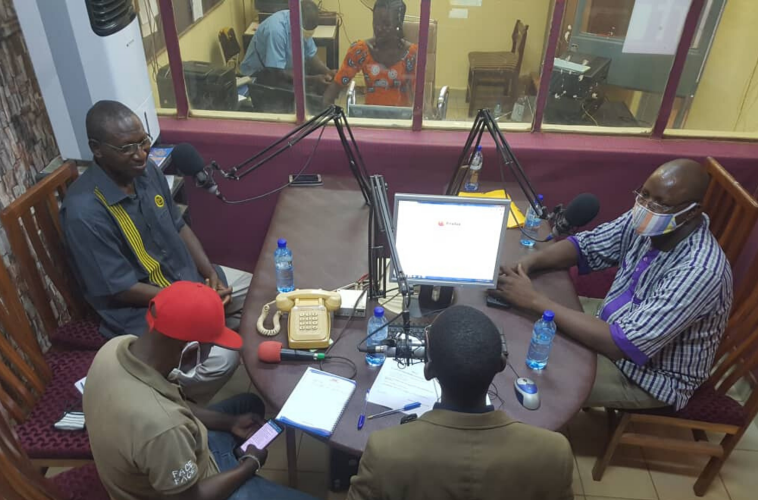Sita Traoré Diallo is a journalist for Le Quotidien, a newspaper based in Ouagadougou, Burkina Faso. The 40-year-old is also part of Coordination of Communicators of Koudougou (CCK), an association of journalists that responds to the needs of local media and, in the face of COVID-19, is adapting to the needs of the population.
The associated was created in 2010 and came out of an event based on the needs of local media. Today, the CCK brings together more than 30 journalists living in Koudougou and working in from radio, television, and print media, offering them professional training and opportunities for collaboration.
The association also works with NGOs that specialize in communication.
Through the CCK, local media can work with these organizations and benefit from their material, financial, and technical support.
Today, the association is responding to a new challenge with a radio series called “Lutte contre le COVID-19” (“Fight against COVID-19).” Broadcast every Saturday from 10 a.m. to 12 p.m., the series aims to inform listeners on news events and key updates related to the pandemic.
In cooperation with regional radio stations, the series is broadcast simultaneously on every frequency in Koudougou, first in French, then in the national languages Mooré and Lele, for about 40 minutes in each language. The radio stations take turn hosting the series each week while the other stations broadcast it.
Before COVID-19, CCK met once every four months. But with this new project, there are meetings twice a week. On Mondays from 11 a.m. to 12 p.m., the members write the episode outline for the weekly broadcast. Ms. Traoré says the members draw from current events to choose the topic of the episode: “We ask ourselves, ‘What news are people talking about without fully understanding?’”
The second meeting is on Saturdays during the broadcast from 10 a.m. to 12 p.m., when a few members host the show or lend a hand in the studio.
Each episode begins with contributions from experts and then invites questions from listeners. According Ms. Traoré, the program has an open policy. She says, “Any listener can call either to ask a question or leave a contribution,” adding that recurring or unanswered questions help to guide future episodes.
One of these questions led to a recent episode on water supplies, which are critical in the fight against COVID-19. Water shortages are common in many parts of Burkina Faso, making it difficult for many people to follow World Health Organization recommendations on handwashing and maintaining one metre of distance between themselves and others.
“Once the water comes back, people go in large numbers to the water points to fetch it,” says Ms. Traoré. “These large groups go against distancing measures.”
The episode featured the head of the National Office for Water and Sanitation, and addressed how those responsible for the water points can manage the situation.
Another episode talked about reopening schools in Burkina Faso. As students prepared to resume their classes, the episode answered questions such as the role of different actors in preventing the spread of COVID-19 at schools.
To create the episodes, CCK works closely with a regional committee of government and health authorities, which is responsible for COVID-19 prevention in Koudougou.
In cooperation with CCK, this committee suggests topics, shares their knowledge on-air, and identifies experts for each episode.
Careful selection of experts is important because, armed with the right information, experts can help bust myths and fight fake news about COVID-19.
“When we don’t have accurate information, it can create risks for the public. You have to have accurate information for a radio series to be effective,” says Ms. Traoré.
Already, “Lutte contre le COVID-19” has been able to address myths about the symptoms of COVID-10 and about the existence of the virus in the Koudougou region.
When the series launched in mid-April, Ms. Traoré says there was no hesitation from radio stations about participating.
She says, “The only problem was the timing. Every radio station already has its broadcasts planned, so the challenge was to find a common time that worked for everyone.”
The program is now so popular that 40 minutes per language isn’t enough for the number of calls they receive. So, CCK is hoping to extend the weekly program by one hour.
Ms. Traoré says the series will continue until it is no longer necessary. She adds: “In any case, as soon as we got together as an association, we noticed that we achieve great things. I invite all journalists to form associations.”
This story is written by Hannah Tellier and originally appeared in Barza Wire, a publication of Farm Radio International. To read more Spotlight stories on radio stations and their work, or to read Farmer stories, go to: https://wire.farmradio.fm/

